The article titled "8 Essential BCBA Responsibilities Every Parent Should Know" shines a light on the vital roles that Board Certified Behavior Analysts (BCBAs) play in supporting children who are undergoing Applied Behavior Analysis (ABA) therapy. It highlights how responsibilities like conducting assessments, training caregivers, and collaborating with other professionals are not just tasks—they're essential steps in crafting effective, personalized treatment plans. These plans are designed to enhance therapeutic outcomes for children with autism.
As parents, understanding these responsibilities can feel overwhelming at times. But don't worry! You're not alone in this journey. By knowing what to expect from BCBAs, you can better support your child and feel more empowered in the process. Let’s explore this together!
Imagine a BCBA working closely with your child, assessing their unique needs and tailoring strategies that resonate with them. This collaboration doesn’t just happen in a vacuum; it involves training caregivers like you and working with other professionals to ensure a holistic approach to your child's development.
So, as we dive deeper into these responsibilities, remember that this is about building a supportive network for your child. We’re here to help you every step of the way!
In essence, the role of a BCBA is to guide you and your child through the intricacies of ABA therapy, ensuring that every step taken is in the best interest of your child's growth and happiness. If you have questions or thoughts, don’t hesitate to share! Your experiences matter, and together we can create a brighter future for our children.
Navigating the challenges of supporting a child with autism can be quite a journey for parents. Understanding the intricacies of Applied Behavior Analysis (ABA) therapy is essential in this process. Board Certified Behavior Analysts (BCBAs) play a pivotal role in crafting personalized treatment plans, but parents often wonder about the specific responsibilities these professionals hold.
How can parents actively contribute to their child's progress? What are the key responsibilities of BCBAs that can empower parents in this journey? This article delves into the eight essential BCBA responsibilities every parent should know. Together, we’ll highlight the importance of informed participation in the therapeutic process. Let’s explore this together!
At Rori Care - ABA Services, we take a friendly, data-driven approach to create individualized ABA plans tailored to the unique needs of every young person. It all starts with a thorough evaluation by our psychiatric experts, ensuring that the treatment plan effectively addresses specific behavioral challenges and developmental goals.
Our innovative behavioral care engine conducts functional behavior analysis and generates automatic progress reports for clinicians. This significantly boosts treatment efficiency, freeing up 50% more time for youth care! Plus, with the integration of AI technology, we can continuously refine these plans based on real-time data and progress monitoring.
We believe in the power of personalized planning and measurable goals, which are essential for achieving the best therapeutic outcomes. Caregiver education is also key in enhancing ABA results, empowering families to actively join their loved one's therapy journey.
Let’s explore this together! We’re here to help you every step of the way!
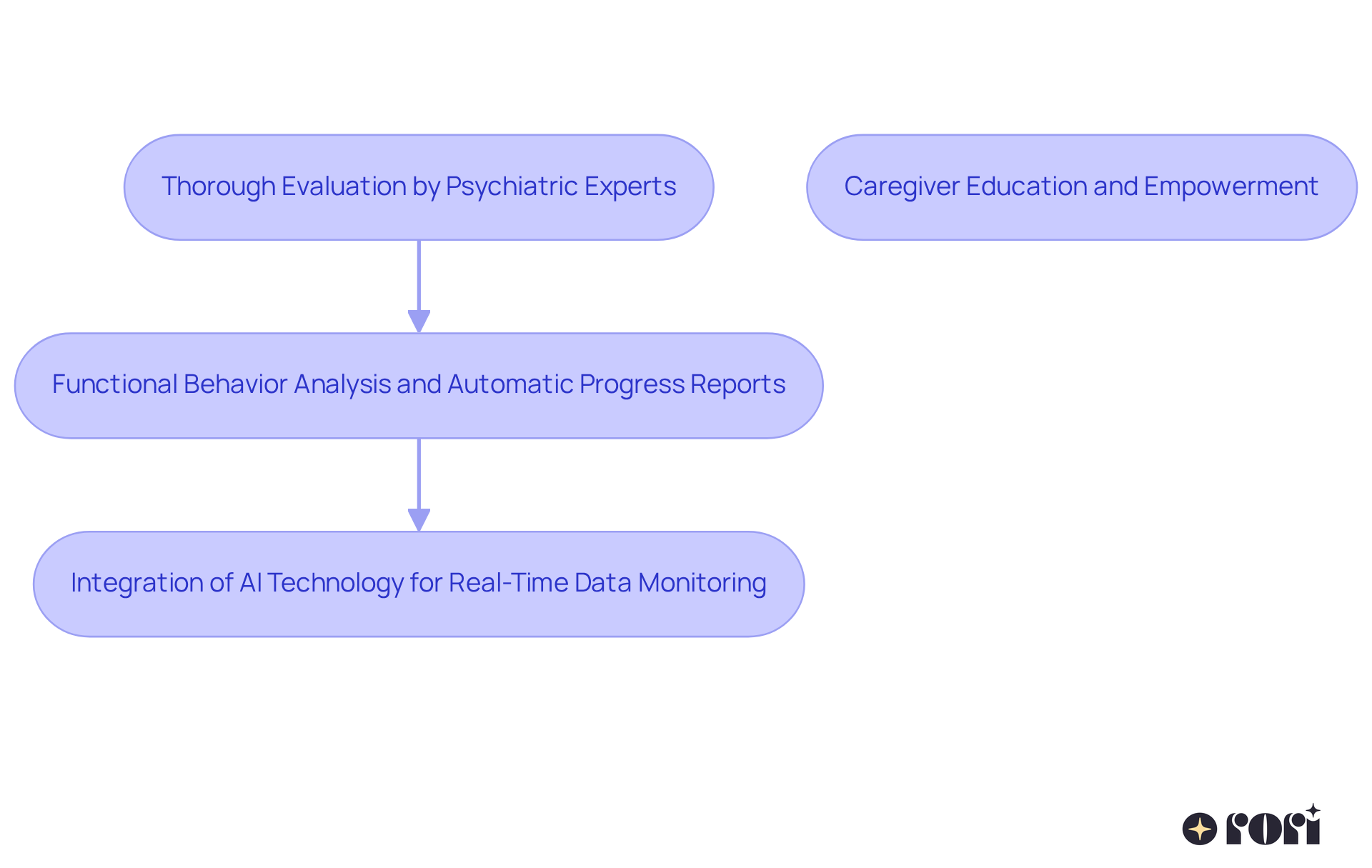
Behavior analysts play an important role in understanding our young ones. They conduct thorough evaluations to explore a child's behavioral tendencies, strengths, and challenges. These assessments often involve interviews, observations, and standardized tests, giving us a well-rounded view of what our child needs. By getting to the heart of what influences their actions, BCBAs can address their BCBA responsibilities by developing targeted interventions that promote positive outcomes.
Our behavior care engine is pretty amazing! It combines personalized therapy with cutting-edge AI technology to perform functional behavior analysis for specific behaviors and skills. Plus, it automatically generates progress reports for clinicians to review. This innovative approach not only makes evaluations smoother but also frees up 50% more time for direct treatment of our children.
To support your child's behavioral goals, why not get involved in the data collection process? Sharing insights with your BCBA can greatly influence their BCBA responsibilities. Let’s explore this together! Your participation can really help guide the journey toward positive change.
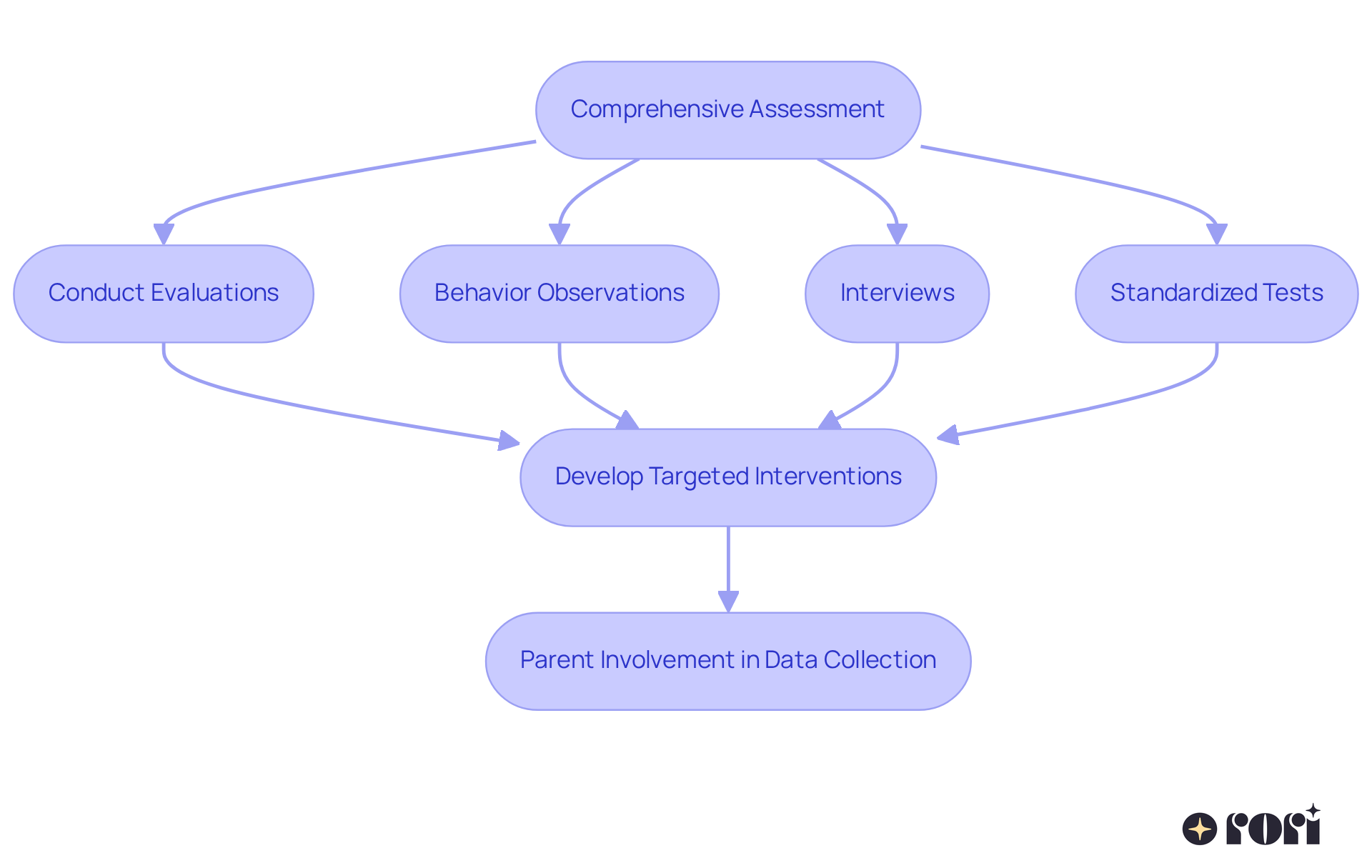
The bcba responsibilities include playing a crucial role in helping your child progress in therapy. They continuously collect and analyze data to keep track of how things are going. This means they monitor specific actions, measure results, and tweak treatment plans based on what the data reveals. By using different methods like frequency/event & rate recording, duration recording, and latency recording, BCBAs can spot trends that help them decide how effective the interventions are.
Ongoing data gathering is essential for customizing treatment to meet your child’s evolving needs. Research shows that when recommended therapy hours are fully implemented, especially with active participation from caregivers, a remarkable 90% of individuals show significant progress. Isn’t that encouraging? Our behavior care engine makes this process even smoother by automatically updating behavior intervention and skill acquisition plans after each session based on the progress achieved.
Plus, with advanced AI technology, we can create progress reports automatically, freeing up 50% more time for direct treatment. This continuous evaluation ensures that the BCBA responsibilities align with your child’s current needs and enhance the overall effectiveness of the intervention. Ultimately, this leads to better outcomes for individuals with autism, and we’re here to help you every step of the way!
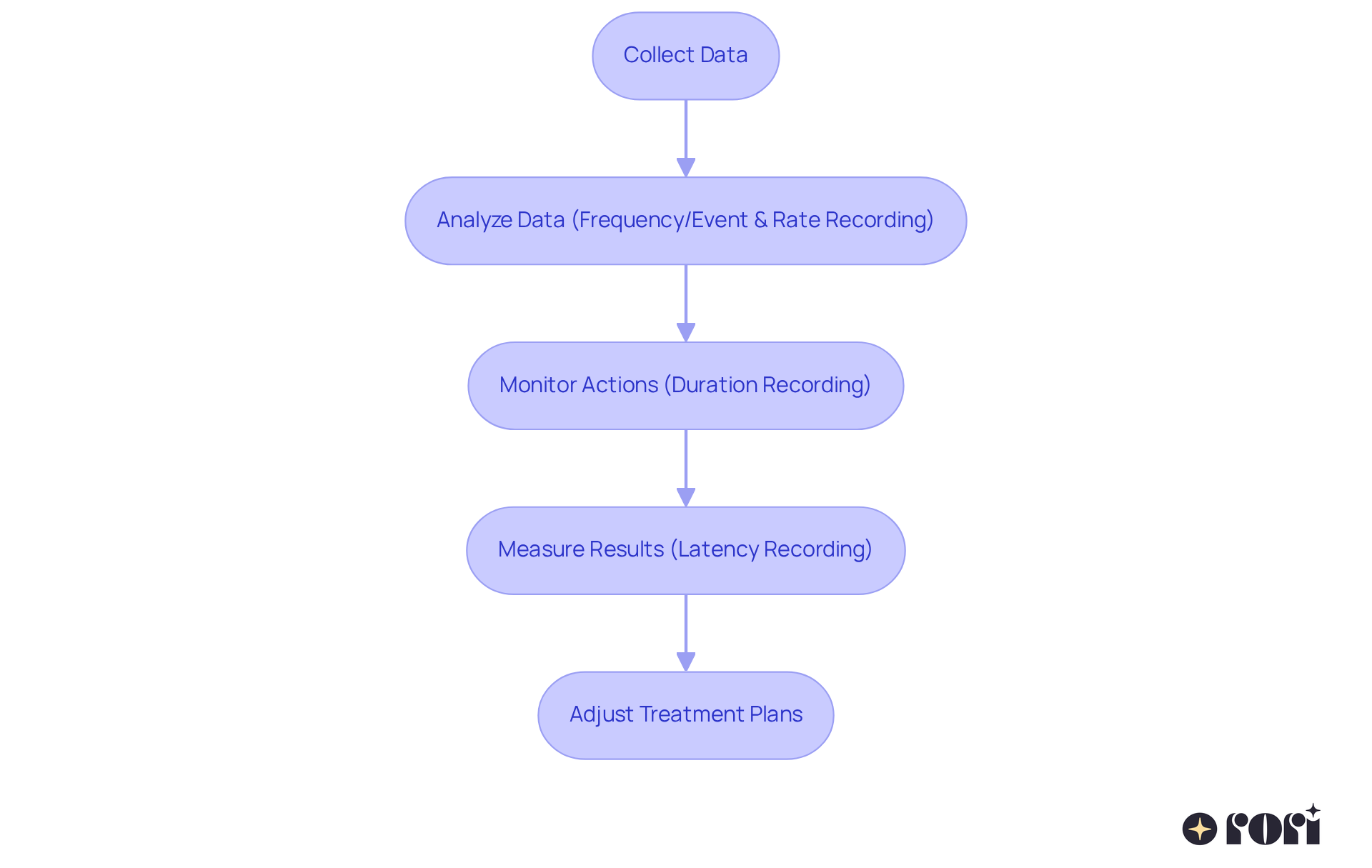
One of the key BCBA responsibilities is teaching caregivers how to support their child's ABA treatment at home. This training often includes sharing reinforcement strategies, behavior management techniques, and ways to implement specific interventions. By helping parents understand ABA principles and strategies, behavior analysts fulfill their BCBA responsibilities while creating a collaborative atmosphere that boosts therapy effectiveness and ensures consistency across different settings.
Active involvement from caregivers is crucial! With ongoing education, they can adapt treatment plans based on progress reports, leading to better behavioral outcomes. This partnership is essential for achieving lasting success in behavior change. Let’s explore this together and see how we can make a difference in your child's journey!
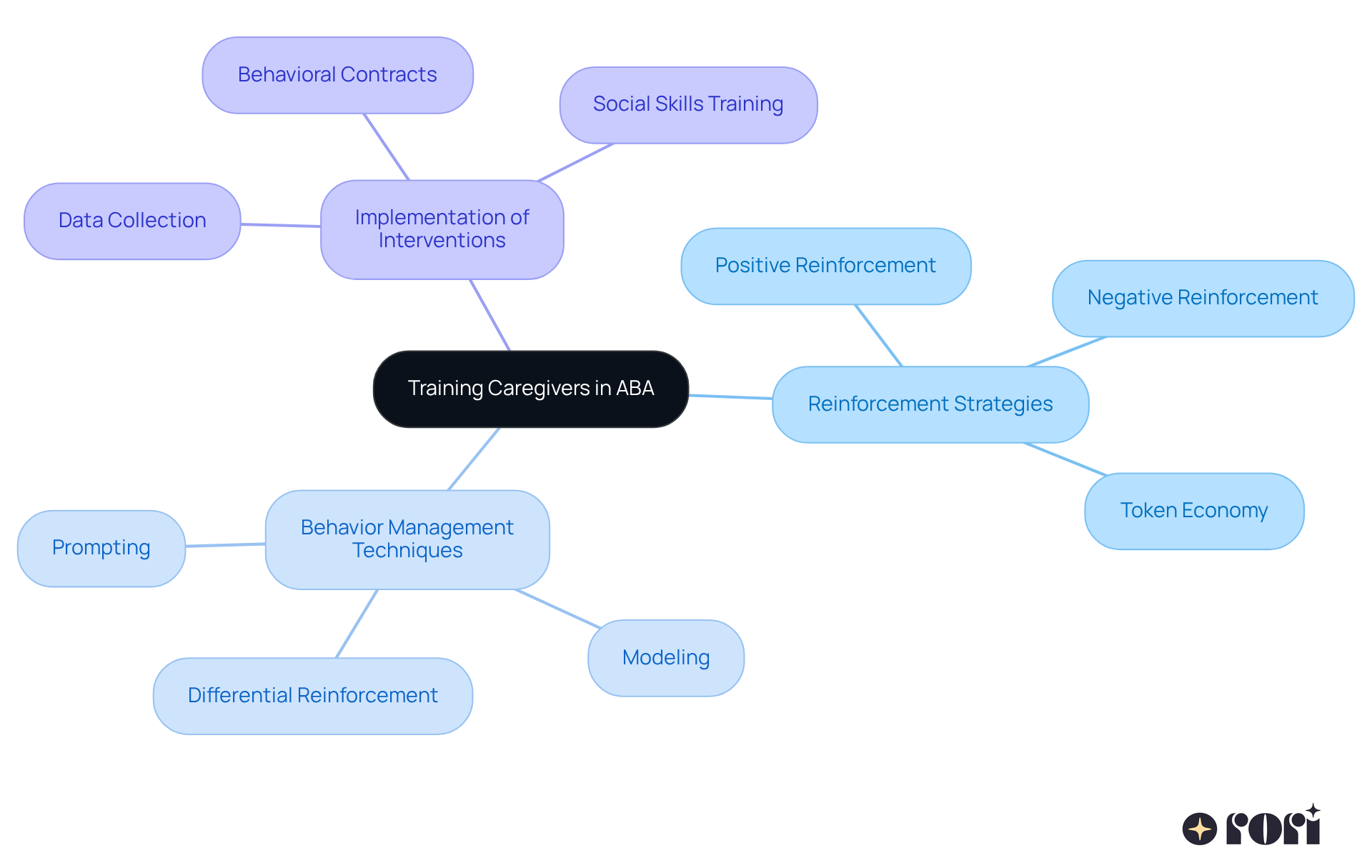
The responsibilities of Board-Certified Behavior Analysts (BCBAs) are vital in crafting personalized treatment strategies that cater to the unique needs of every young individual. These plans are thoughtfully designed based on thorough assessments and ongoing data analysis, ensuring they remain relevant and effective. At Rori Care - ABA Therapy, we enhance this process by integrating advanced AI technology that automates progress report creation. This allows BCBAs to focus more on direct treatment, freeing up 50% more time for interventions and significantly boosting efficiency.
Continuous data gathering is crucial for tailoring and refining each individual’s ABA therapy plan to support their success. Our automated data collection system documents sessions seamlessly, without interrupting the therapeutic process, ensuring our clinical team is always available for your loved one. Plus, all data is securely stored, anonymized, and deleted after analysis, prioritizing your child’s privacy.
By setting specific goals and utilizing evidence-based strategies, the BCBA responsibilities include enhancing the learning experience while fostering a sense of ownership and motivation in their progress. Research shows that personalized ABA therapy boasts an impressive success rate of over 89% in improving various developmental aspects for individuals with Autism Spectrum Disorder (ASD). For instance, young individuals receiving tailored interventions have shown remarkable advancements in cognitive abilities and daily living skills. This personalized approach not only addresses the core challenges faced by autistic youth but also empowers families to engage actively in their child’s development, leading to more successful outcomes.
Moreover, teaching caregivers about ABA principles and strategies not only enhances their ability to support their child’s behavioral goals but also aligns with the BCBA responsibilities of strengthening the collaborative nature of effective treatment. As one expert wisely noted, "By systematically collecting and analyzing data, ABA therapists can make informed decisions and tailor treatment plans to meet the unique needs of each individual."
Let’s explore this journey together! We’re here to help you every step of the way!
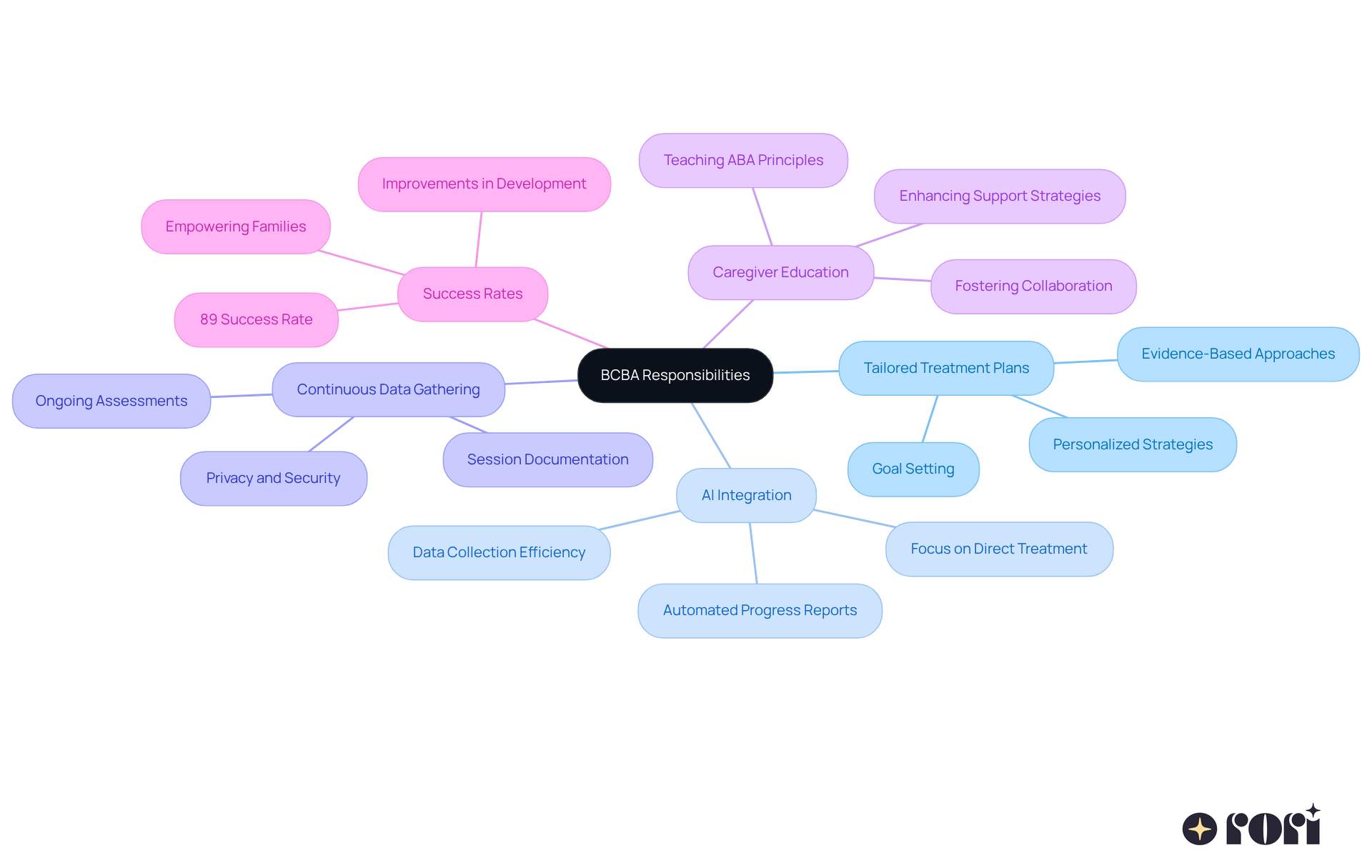
The responsibilities of Board Certified Behavior Analysts (BCBAs) are vital in supervising Registered Behavior Technicians (RBTs) to ensure that therapy is delivered with both fidelity and quality. This supervision is all about providing guidance, feedback, and support to RBTs as they implement treatment plans. A key part of this process is the RBT Competency Assessment, which evaluates the practical skills and knowledge necessary for RBT certification.
With the growing demand for RBTs in the healthcare sector, it’s crucial that board-certified behavior analysts carry out their BCBA responsibilities by supervising the RBTs' training and development. This culminates in passing the board exam that evaluates their proficiency in the RBT Task List. By regularly observing sessions and conducting performance evaluations, BCBAs can address their BCBA responsibilities by identifying areas for improvement and reinforcing effective practices.
Additionally, completing required supervision hours is vital for RBTs to be adequately prepared to deliver effective therapy. This oversight is essential for upholding high standards of care and ensuring that young individuals receive the best possible support in line with BCBA responsibilities. Parents, you should feel empowered to inquire about the specific training and supervision your student's RBT is receiving. This can provide valuable insights into the quality of care being delivered and the strategies being employed to maximize behavioral support and intervention.
Let’s explore this together! Understanding the role of BCBAs and RBTs can help you feel more connected and informed about your child’s therapy journey.
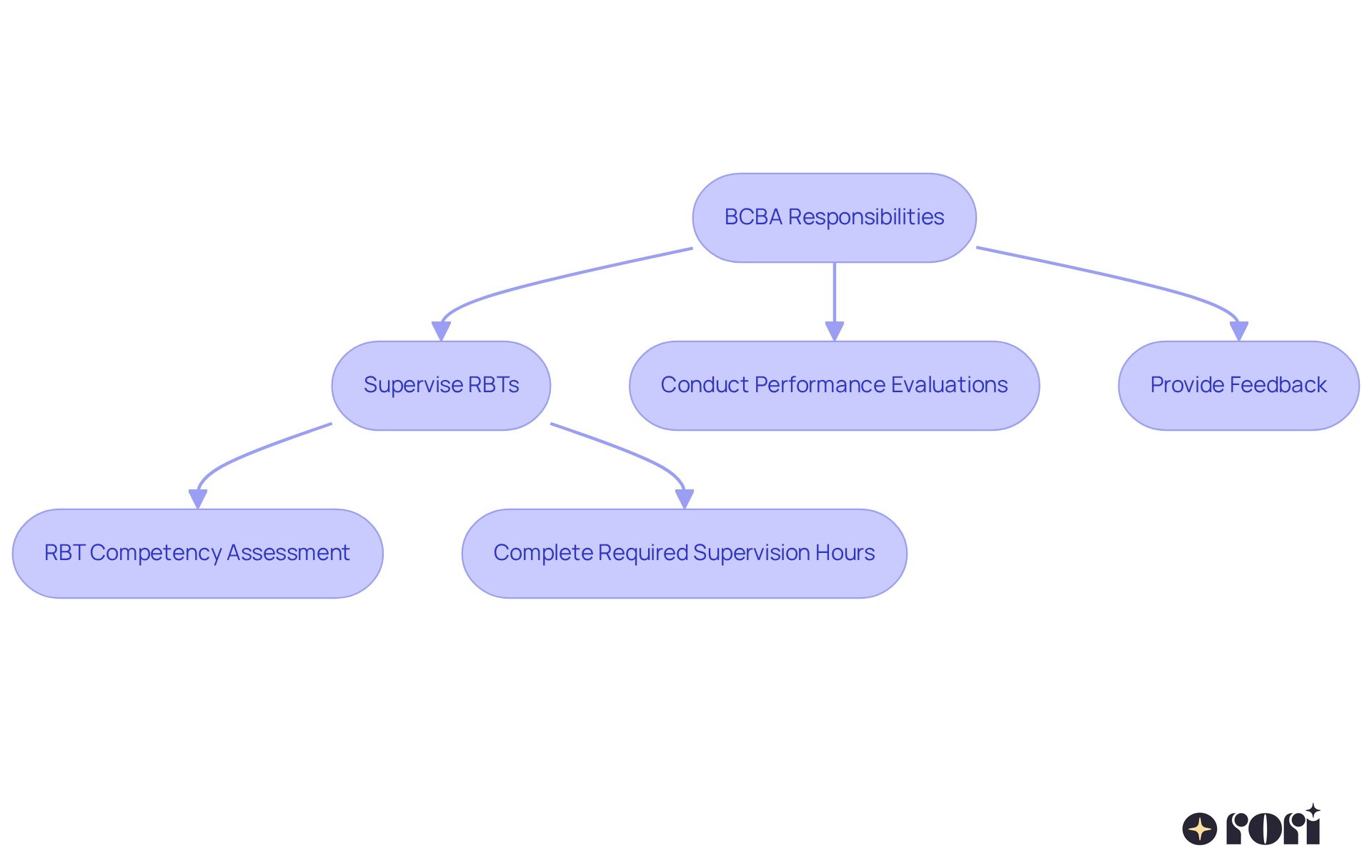
Behavior analysts play a crucial role in providing parent training that significantly enhances home support techniques for youth undergoing ABA therapy. This training is designed to equip parents with the skills they need to boost therapeutic techniques, manage challenging behaviors, and create a nurturing environment that benefits their children's development.
By providing families with practical tools and strategies, BCBAs fulfill their bcba responsibilities to encourage active parental involvement, which is essential for achieving consistent and effective outcomes. Studies show that parent education can greatly reduce stress and improve overall family interactions, leading to better youth development and social communication skills.
Notably, 15 out of 17 studies found a positive treatment effect from parental training, highlighting how structured training maximizes the benefits of ABA therapy. Plus, telehealth training has successfully taught naturalistic teaching strategies to five parent-child dyads, showcasing its effectiveness as a delivery method.
The knowledge and skills gained through caregiver education boost caregivers' confidence in their ability to support their children, promoting informed decision-making and improved behavioral outcomes. Ultimately, the collaboration between behavior analysts and parents helps fulfill the bcba responsibilities, creating a robust support system that significantly aids in the development and well-being of young individuals.
Parents are encouraged to engage with BCBAs and explore telehealth resources to enhance their training experience. Let’s explore this together! We’re here to help you every step of the way!
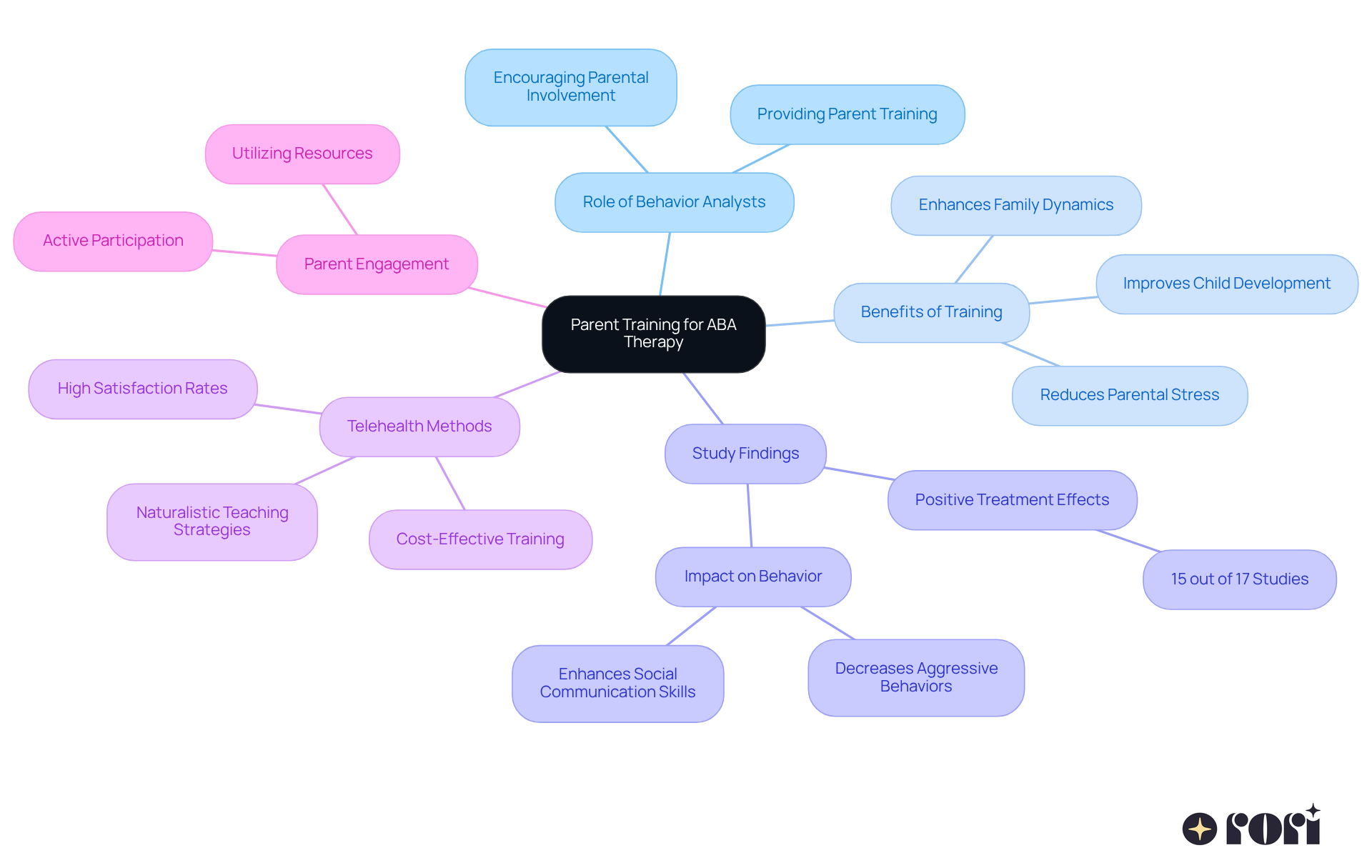
Cooperation among experts like speech-language pathologists, occupational therapists, and educators is so important for providing the best support to youth with autism. This teamwork means sharing insights, coordinating interventions, and aligning goals, all of which help meet the unique needs of each child. 🌟 Not only does this collaborative approach boost the effectiveness of treatment outcomes, but it also creates a nurturing environment that supports overall growth.
By blending their diverse skills, these professionals can craft a comprehensive care strategy that helps young individuals thrive in many areas of their lives. Let’s explore this together and see how teamwork can make a real difference!
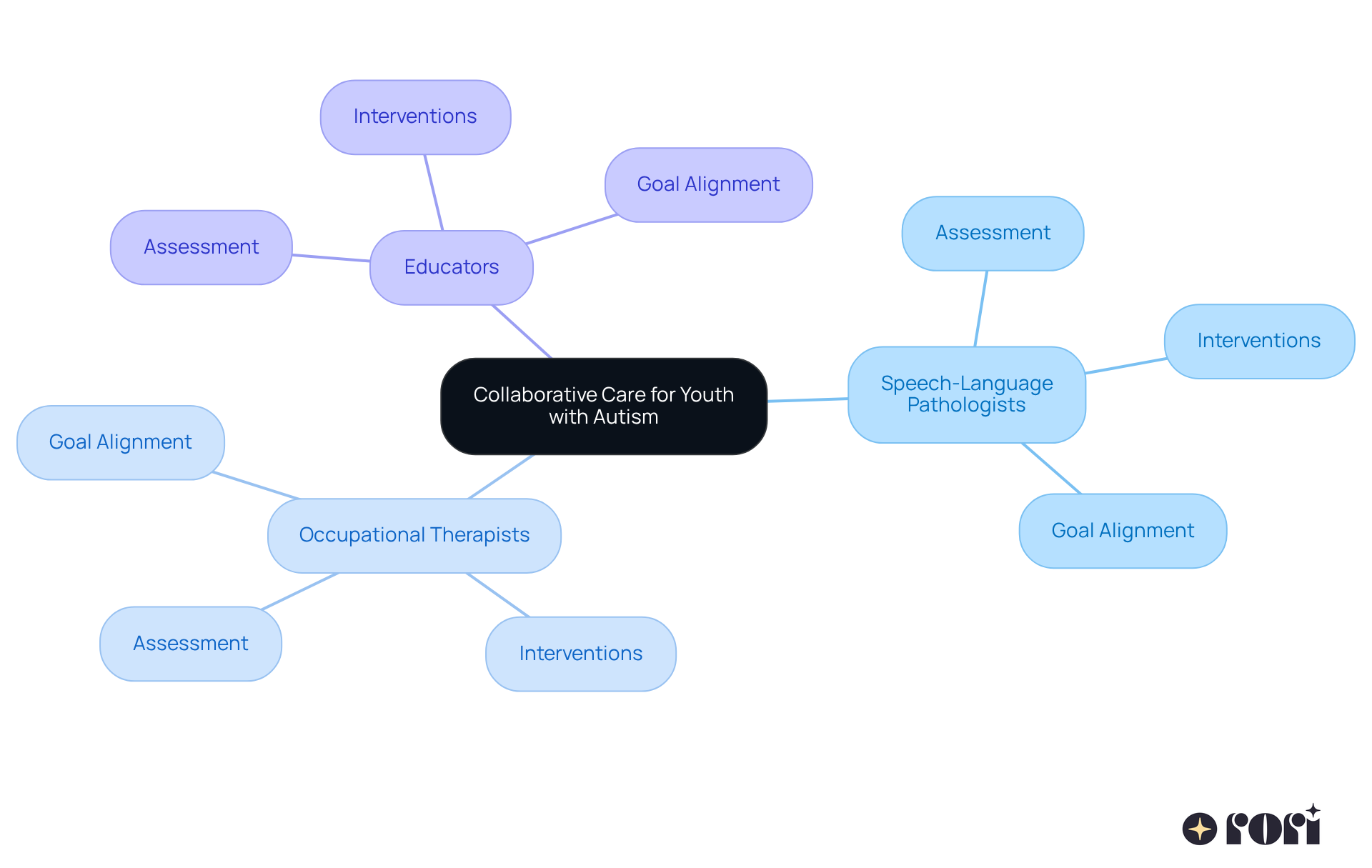
Certified analysts are here to help! They play a crucial role in performing Functional Behavior Assessments (FBAs), which help us understand the triggers and purposes behind challenging behaviors in children with autism. This systematic approach involves gathering information through:
to identify what’s really going on.
By using automatic data collection methods, our clinical team can keep an eye on sessions without interrupting the flow. This means all the important information is securely stored and anonymized for analysis. With this data, BCBAs can fulfill their responsibilities by creating targeted interventions that address the root of the issue rather than just the symptoms.
Plus, our care engine updates intervention and skill acquisition plans based on the progress we see during treatment sessions. When caregivers are actively involved and the recommended therapy hours are fully utilized, we often see substantial progress in 90% of children! 🌟 This proactive approach is essential for fostering positive behavior changes and improving the child’s overall well-being.
Let’s explore this together! We’re here to help you every step of the way!
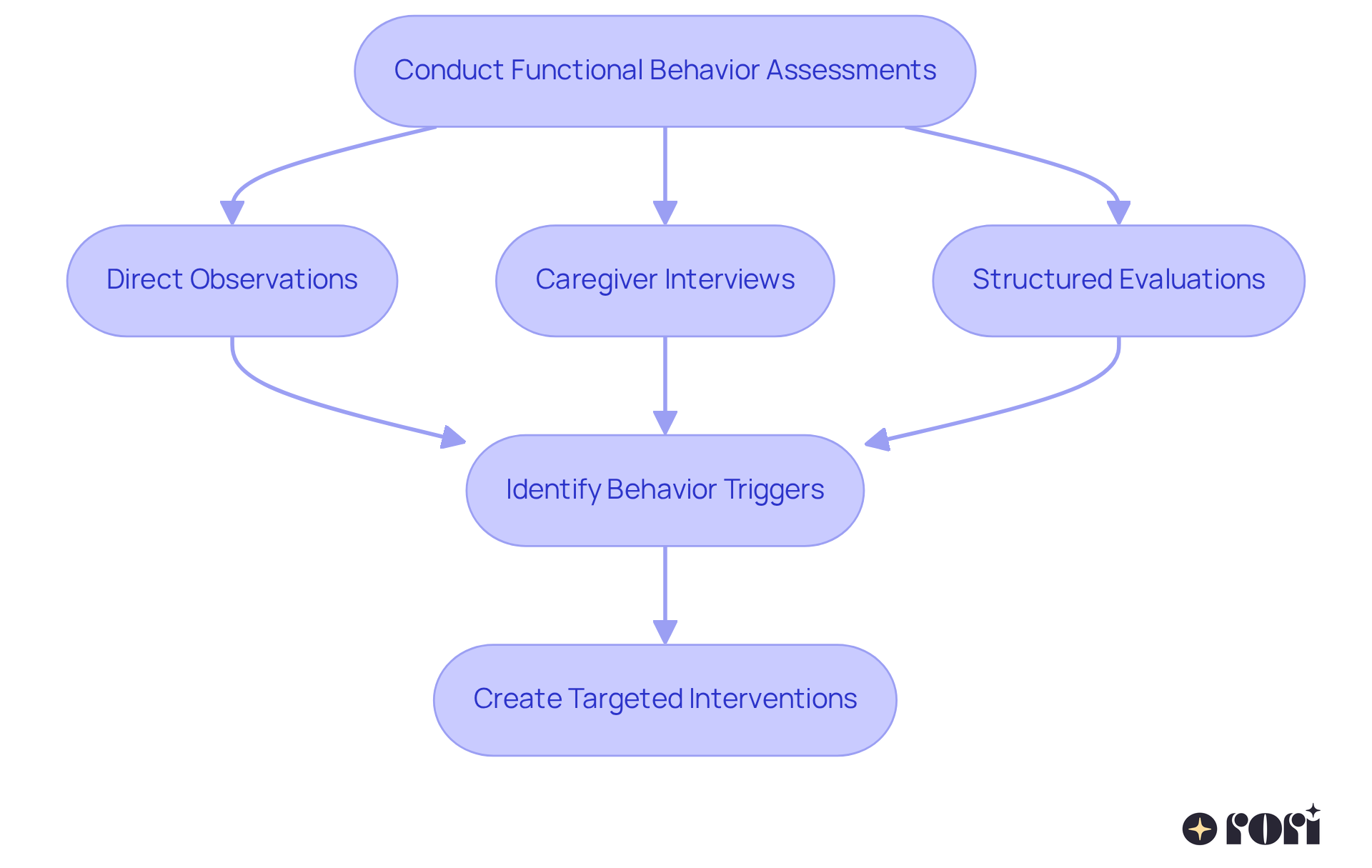
To keep their certification, BCBA responsibilities require Board Certified Behavior Analysts to complete 32 continuing education units (CEUs) every two years. Staying updated on the latest research and best practices in behavior analysis is essential. This commitment to ongoing learning is vital for ensuring that behavior analysts fulfill their BCBA responsibilities by having the knowledge and skills to provide effective and ethical care.
When behavior analysts engage in lifelong learning, they not only enhance their own practice but also contribute significantly to the growth of the field. This dedication leads to better outcomes for the children and families they support, highlighting how important certification is in behavior analysis as a foundation for quality care.
Moreover, when caregivers are equipped with knowledge of ABA principles and strategies, it supports the BCBA responsibilities of Board Certified Behavior Analysts. This partnership allows caregivers to provide better assistance at home, fostering informed decision-making. As a result, we see improved behavioral outcomes and greater confidence among caregivers.
Additionally, maintaining certification can bring career benefits too. For instance, BCBAs in Texas earn an average salary of $80,000, showing the tangible rewards of pursuing ongoing education. So, let’s explore this together and see how we can support each other in this journey!
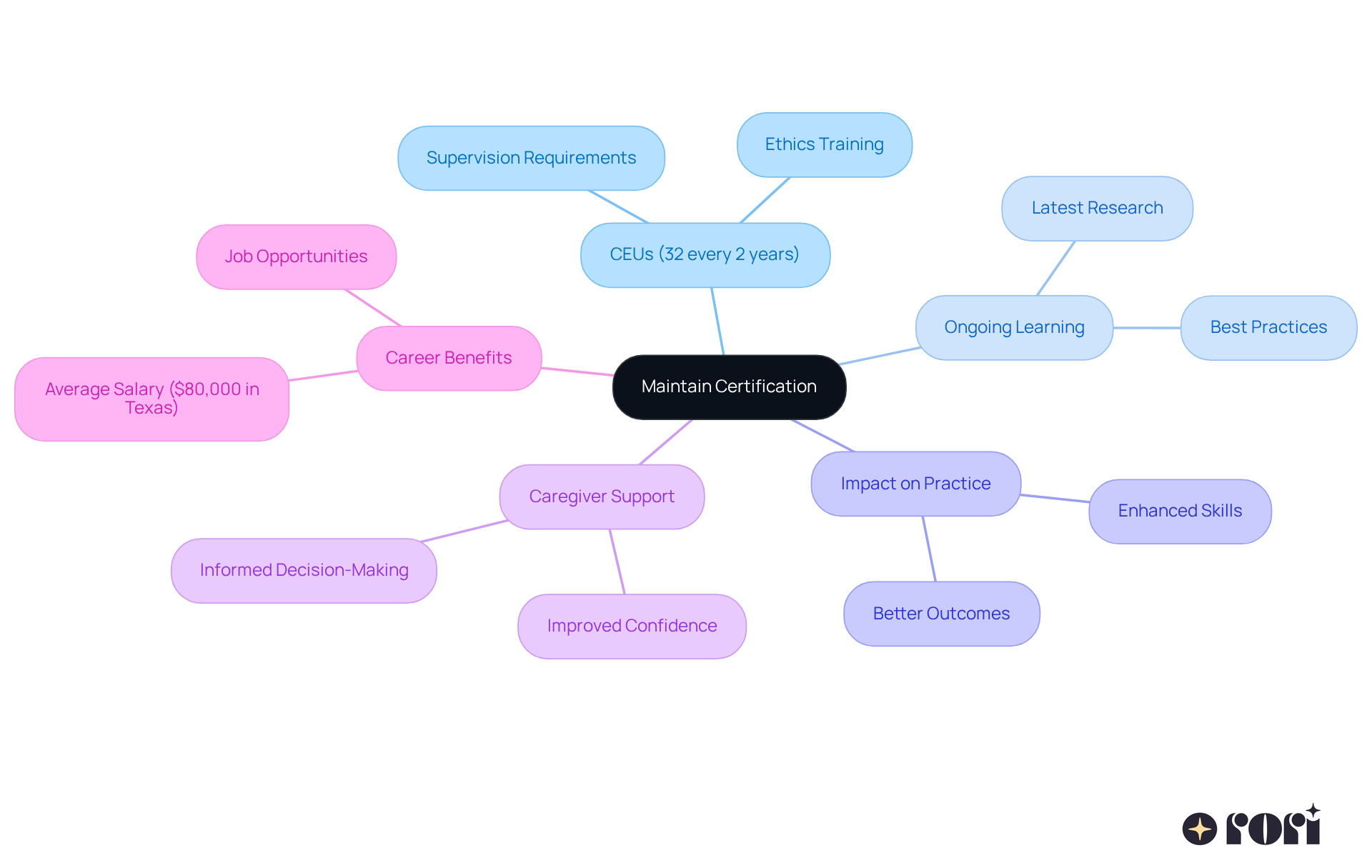
Understanding the essential responsibilities of Board Certified Behavior Analysts (BCBAs) is crucial for parents navigating the complexities of ABA therapy for their children. These professionals play a pivotal role in tailoring treatment plans, conducting thorough assessments, and continuously monitoring progress to ensure that each child's unique needs are met. By engaging with BCBAs, parents can foster a collaborative environment that enhances therapeutic outcomes and empowers their children.
Throughout this article, we’ve highlighted several key aspects of BCBA responsibilities. From comprehensive assessments to data collection, caregiver training, and collaboration with other professionals, these elements work together to create a holistic approach to therapy. This ensures that interventions are both effective and individualized. Plus, the integration of technology, like AI in data analysis and progress tracking, significantly enhances the efficiency of treatment delivery.
Ultimately, we encourage parents to take an active role in their child's therapy journey. By understanding the intricacies of BCBA responsibilities and engaging in the process, families can contribute to achieving positive behavioral changes and improved developmental outcomes. The partnership between parents and behavior analysts is vital; together, they can create a supportive framework that nurtures growth and fosters success for children with autism. Let’s explore this journey together!
What is Rori Care's approach to ABA therapy?
Rori Care uses a friendly, data-driven approach to create individualized ABA plans tailored to the unique needs of each child, starting with a thorough evaluation by psychiatric experts.
How does Rori Care ensure the effectiveness of treatment plans?
The effectiveness of treatment plans is ensured through comprehensive assessments that explore a child's behavioral tendencies, strengths, and challenges, allowing for targeted interventions.
What role does technology play in Rori Care's ABA therapy?
Rori Care integrates AI technology within its behavioral care engine to conduct functional behavior analysis, generate automatic progress reports, and continuously refine treatment plans based on real-time data.
How does caregiver involvement impact ABA therapy outcomes?
Caregiver education and involvement are key in enhancing ABA results, as active participation from families can significantly influence the therapy journey and promote positive outcomes.
What methods do behavior analysts use to monitor progress?
Behavior analysts use various methods such as frequency/event recording, duration recording, and latency recording to monitor specific actions and measure results, allowing them to adjust treatment plans accordingly.
What is the significance of ongoing data collection in ABA therapy?
Ongoing data collection is essential for customizing treatment to meet a child's evolving needs, and research shows that when therapy hours are fully implemented with caregiver participation, 90% of individuals show significant progress.
How does Rori Care's behavior care engine improve treatment efficiency?
The behavior care engine improves treatment efficiency by automatically updating behavior intervention and skill acquisition plans after each session and freeing up 50% more time for direct treatment.